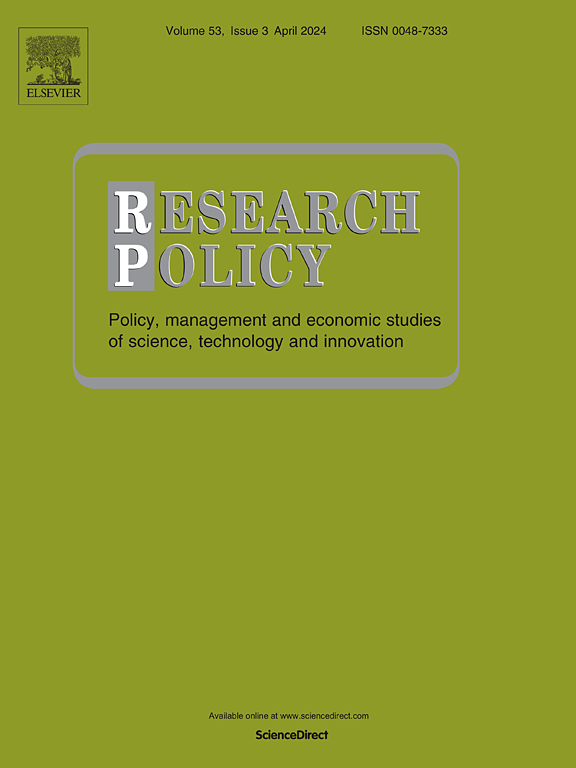解除时间约束对女性企业经营绩效的影响:一个实地实验
IF 8
1区 管理学
Q1 MANAGEMENT
引用次数: 0
摘要
女性企业主的收入通常低于男性同行。先前的研究表明,无条件的现金转移可以提高男性的业务绩效,但对女性没有作用。一种可能的解释是,女性企业主可能面临独特的限制,因此,她们可能不会将无条件的现金转移用于自己的业务。在本文中,我测试了为女性拥有的企业提供节省时间的服务是否可以提高其绩效。与现金不同,这种干预不能转移给其他家庭成员。我重新分析了一项实地实验的数据,在这项实验中,肯尼亚的职业母亲被随机分配到接受现金和节省时间的服务(免费用餐和洗衣)的组,或者是对照组。我关注的是一个子样本,她们是企业主(N = 557)。我的研究结果显示,与对照组相比,那些接受节省时间服务的人的收入增加了70.4%。与先前的研究结果一致,现金接受者的表现并不比对照组好。这些现金经常用于食品和学费等家庭开支,这可能是其未能增加收入的原因。这些发现表明,节省时间的干预措施可以通过减轻对妇女造成不成比例影响的繁重家务,有效地有助于缩小业务绩效方面的性别差距。我的研究强调了有针对性的干预措施对提高女性拥有的企业绩效的潜在影响,强调需要采取细致入微的方法,在全球范围内营造包容性的商业环境。研究表明,向企业主提供现金可以提高男性的企业绩效,但对女性没有作用。我提出并展示了证据,证明现金干预可能不会像男性那样惠及女性,因为性别特定的期望和限制——比如更高的家务要求——现金转移无法直接解决。在本文中,我测试了直接解决这些性别时间限制的替代干预措施:节省时间的服务。我分析了先前进行的实地实验的数据,结果表明,与接受现金的小企业主相比,接受节省时间服务的小企业主的收入增加了70.4%。我的论文提供了一些迄今为止最严谨的证据,表明进餐和洗衣服务等节省时间的干预措施可能有效地缩小企业绩效中的性别差距。这些见解可以帮助个人、政策制定者和组织领导者设计政策,通过消除女性独有的家务负担来缩小业务绩效中的性别差距。本文章由计算机程序翻译,如有差异,请以英文原文为准。
The effect of relieving time constraints on the business performance of women-owned businesses: A field experiment
Women business owners typically earn less than their male counterparts. Previous research has shown that unconditional cash transfers increase business performance for men but not women. One possible explanation is that female business owners may face unique constraints and, as a result, may not spend the unconditional cash transfer on their business. In this paper, I test whether providing time-saving services to women-owned businesses can boost their performance. Unlike cash, this intervention is not transferable to other household members. I reanalyze data from a field experiment, in which working mothers in Kenya were randomly assigned to receive cash, time-saving services (free meals and laundry), or to a control group. I focus on a subsample of working mothers who are business owners (N = 557). My results show that those who received time-saving services reported a 70.4 % increase in revenue compared to the control group. In line with prior findings, cash recipients did not outperform the control group. The cash was frequently spent on household expenses like food and school fees, potentially explaining its failure to increase revenues. These findings suggest that time-saving interventions may effectively contribute to closing the gender gap in business performance by alleviating burdensome chores that disproportionately affect women. My study highlights the potential impact of targeted interventions to boost the performance of women-owned businesses, emphasizing the need for nuanced approaches to foster inclusive business environments worldwide.
Significance statement
Research suggests that providing cash to business owners increases business performance for men but not women. I propose and show evidence that cash interventions may not benefit women as much as men due to gender-specific expectations and constraints – like higher chore demands – that cash transfers do not directly address. In this paper, I test an alternative intervention that directly addresses these gendered time constraints: time-saving services. Analyzing data from a previously run field experiment, I show that small business owners who receive time-saving services report a 70.4 % increase in earnings compared to those who receive cash. My paper provides some of the most rigorous evidence to date showing that time-saving interventions such as meal and laundry services may effectively narrow the gender gap in business performance. Such insights could help individuals, policymakers, and organizational leaders design policies to close the gender gap in business performance by removing the chore burdens that uniquely affect women.
求助全文
通过发布文献求助,成功后即可免费获取论文全文。
去求助
来源期刊

Research Policy
MANAGEMENT-
CiteScore
12.80
自引率
6.90%
发文量
182
期刊介绍:
Research Policy (RP) articles explore the interaction between innovation, technology, or research, and economic, social, political, and organizational processes, both empirically and theoretically. All RP papers are expected to provide insights with implications for policy or management.
Research Policy (RP) is a multidisciplinary journal focused on analyzing, understanding, and effectively addressing the challenges posed by innovation, technology, R&D, and science. This includes activities related to knowledge creation, diffusion, acquisition, and exploitation in the form of new or improved products, processes, or services, across economic, policy, management, organizational, and environmental dimensions.
 求助内容:
求助内容: 应助结果提醒方式:
应助结果提醒方式:


